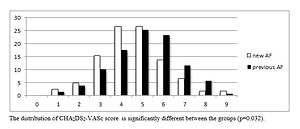Current issue
Archive
Manuscripts accepted
About the Journal
Editorial office
Editorial board
Section Editors
Abstracting and indexing
Subscription
Contact
Ethical standards and procedures
Most read articles
Instructions for authors
Article Processing Charge (APC)
Regulations of paying article processing charge (APC)
CARDIOLOGY / CLINICAL RESEARCH
A worsened prognosis for patients after stroke with newly diagnosed atrial fibrillation compared to having a preexisting arrhythmia
1
Clinic Of Neurology, Swietokrzyskie Neurology Center, Poland
2
Faculty of Medical and Health Sciences, The University of Jan Kochanowski, Kielce, Poland
3
Department of Internal Diseases and Diabetology, Hospital St. Alexander, Poland
4
1st Clinic of Cardiology and Electrotherapy, Swietokrzyskie Cardiology Center, Kielce, Poland
Submission date: 2022-03-30
Final revision date: 2022-07-06
Acceptance date: 2022-07-25
Online publication date: 2022-08-03
Corresponding author
Iwona Gorczyca-Głowacka
Faculty of Medical and Health Sciences, The University of Jan Kochanowski, Kielce, Poland
Faculty of Medical and Health Sciences, The University of Jan Kochanowski, Kielce, Poland
KEYWORDS
TOPICS
ABSTRACT
Introduction:
Atrial fibrillation (AF) is a major cause of ischemic stroke. Patients with undiagnosed AF lack the stroke prevention provided by oral anticoagulants. The aim of this study was to compare the in-hospital mortality rate between ischemic stroke patients diagnosed with AF de novo and ischemic stroke patients diagnosed with AF prior to hospitalization for stroke.
Material and methods:
We identified patients admitted to the Neurology Center during the years 2013–2014 with acute ischemic stroke and AF. We analyzed in-hospital outcomes in patients with newly diagnosed AF and those with known AF. The study endpoint was death during hospitalization.
Results:
The study included 2,000 patients with acute ischemic stroke, out of whom 579 patients (29%) were diagnosed with AF. AF was newly diagnosed in 123 patients (21.2%) (new-AF group), while 456 patients (78.8%) had a history of AF (previous-AF group). The mean National Institutes of Health Stroke Scale (NIHSS) score at admission was 7.2 points in the new-AF group and 3.7 in the previous-AF group (p < 0.001). In-hospital death was more common in the new-AF group (13 patients, 10.6%) than in the previous-AF group (16 patients, 3.5%) (p = 0.003). In multivariate analysis, the NIHSS score at admission in the new-AF group was associated with higher mortality, while in the previous-AF group, the NIHSS score at admission and multiple ischemic foci were risk factors of in-hospital mortality.
Conclusions:
Newly diagnosed AF in ischemic stroke patients significantly worsens prognosis compared to patients previously diagnosed with AF. Early detection of latent AF and subsequent use of anticoagulation are important in preventing severe stroke.
Atrial fibrillation (AF) is a major cause of ischemic stroke. Patients with undiagnosed AF lack the stroke prevention provided by oral anticoagulants. The aim of this study was to compare the in-hospital mortality rate between ischemic stroke patients diagnosed with AF de novo and ischemic stroke patients diagnosed with AF prior to hospitalization for stroke.
Material and methods:
We identified patients admitted to the Neurology Center during the years 2013–2014 with acute ischemic stroke and AF. We analyzed in-hospital outcomes in patients with newly diagnosed AF and those with known AF. The study endpoint was death during hospitalization.
Results:
The study included 2,000 patients with acute ischemic stroke, out of whom 579 patients (29%) were diagnosed with AF. AF was newly diagnosed in 123 patients (21.2%) (new-AF group), while 456 patients (78.8%) had a history of AF (previous-AF group). The mean National Institutes of Health Stroke Scale (NIHSS) score at admission was 7.2 points in the new-AF group and 3.7 in the previous-AF group (p < 0.001). In-hospital death was more common in the new-AF group (13 patients, 10.6%) than in the previous-AF group (16 patients, 3.5%) (p = 0.003). In multivariate analysis, the NIHSS score at admission in the new-AF group was associated with higher mortality, while in the previous-AF group, the NIHSS score at admission and multiple ischemic foci were risk factors of in-hospital mortality.
Conclusions:
Newly diagnosed AF in ischemic stroke patients significantly worsens prognosis compared to patients previously diagnosed with AF. Early detection of latent AF and subsequent use of anticoagulation are important in preventing severe stroke.
Share
RELATED ARTICLE
We process personal data collected when visiting the website. The function of obtaining information about users and their behavior is carried out by voluntarily entered information in forms and saving cookies in end devices. Data, including cookies, are used to provide services, improve the user experience and to analyze the traffic in accordance with the Privacy policy. Data are also collected and processed by Google Analytics tool (more).
You can change cookies settings in your browser. Restricted use of cookies in the browser configuration may affect some functionalities of the website.
You can change cookies settings in your browser. Restricted use of cookies in the browser configuration may affect some functionalities of the website.



